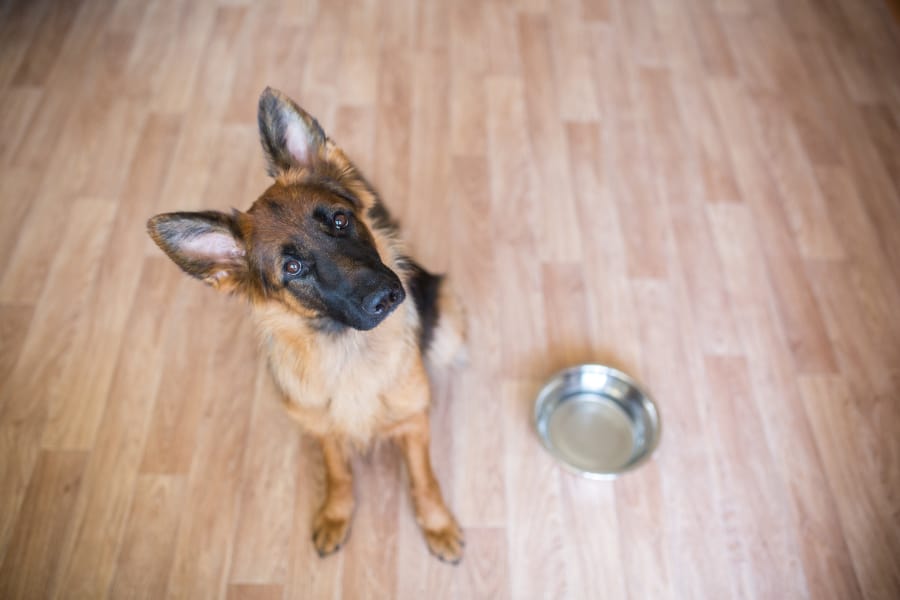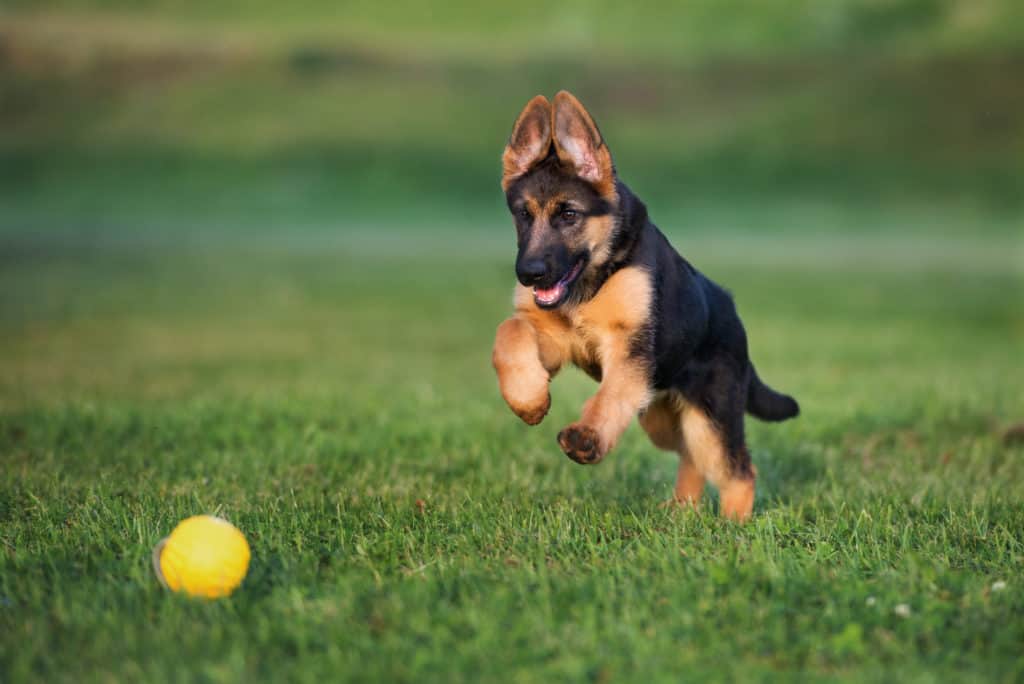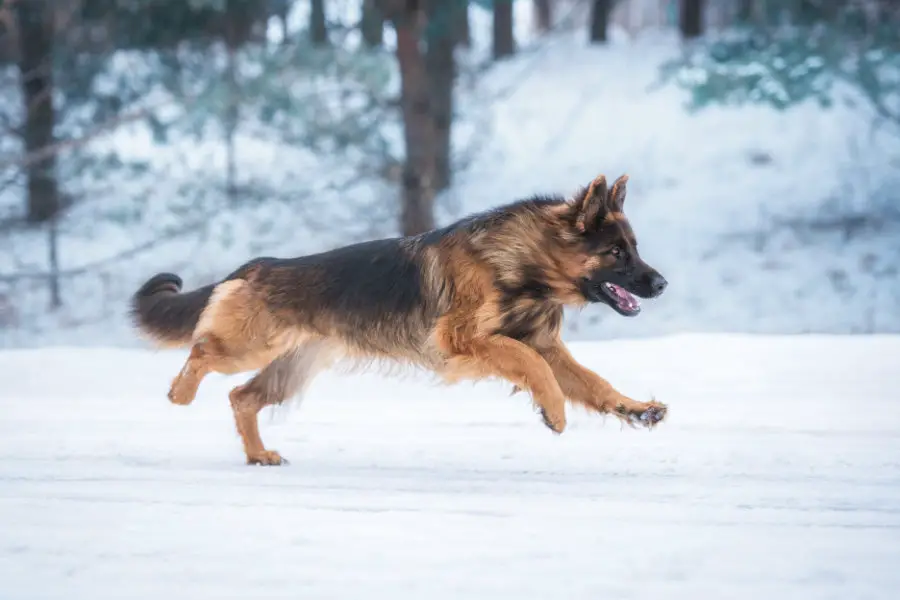German Shepherds make excellent pets, and managing their weight is important to maintain optimum health and keep them a happy part of your family for many years to come. With a good diet and regular exercise, keeping your German Shepherd’s weight in check shouldn’t be a difficult task.
Optimal weight is a key indicator of good health in German Shepherds, and on average, an adult German Shepherd should weigh between 60-90 lbs., though healthy full-grown females can weigh in between 50-70 lbs., and healthy males between 65-90 lbs.
The average lifespan of a German Shepherd is 10-12 years – and it’s important to provide an appropriate diet and steady exercise plan from puppy to adult. Knowledgeable owners can keep their German Shepherd at a healthy weight and even prevent some ailments that are common to the breed.
A Simple German Shepherd Weight Guide
A German Shepherd’s weight should be carefully monitored and maintained throughout their lifetime to ensure proper growth plus bone and joint development. Here is the ideal range for your dog from puppy to adult, by age:
| Age | Males Avg. Weight Range | Females Avg. Weight Range |
|---|---|---|
| 1 week | 1.6 – 2.1 lbs | 1.4 – 2.0 lbs |
| 1 month | 5 – 9 lbs | 4.5 – 8.5 lbs |
| 2 months | 13 – 20 lbs | 11 – 18 lbs |
| 4 months | 33 – 40 lbs | 28 – 35 lbs |
| 6 months | 50 – 56 lbs | 43 – 49 lbs |
| 9 months | 64 – 70 lbs | 55 – 60 lbs |
| 12 months | 68 – 75 lbs | 59 – 64 lbs |
| 18 months + | 75 – 85 lbs | 63 – 68 lbs |
The weights above represent the average weights, so dogs falling slightly above or below the charted weights may still be within the healthy weight range, which is 60 – 90 pounds for males and 50 -70 pounds for females.
When Does A German Shepherd Grow The Most?
German Shepherd puppies go through their largest growth phase between 2 and 5 months. This is the time where they gain their largest percentage of body weight, so it is important for owners to pay careful attention to their puppy’s weight and food intake.
If the puppy is not making significant strides in terms of overall weight gain, owners should consult a licensed veterinarian regarding the dog’s growth rate.

Ideal Diet Plan For German Shepherds
Whether puppy or adult, German Shepherds are high-energy dogs that require plenty of protein and healthy fats in their diet.
Puppies And Young German Shepherds Diet
The following guidelines are for German Shepherd puppies and active young dogs up to 6 months of age.
- A daily caloric intake of 1740 – 2100 is necessary for optimum physical health and well-being.
- 22% of the puppy’s daily calories should be represented by whole proteins, such as beef, fish, chicken, or pork.
- 8% should be represented by healthy Omega-3 fats.
Kibble Provides a Healthy Diet for a German Shepherd
While fresh food diets are an option, the specialized kibbles designed for large-breed puppies will contain the appropriate percentages of protein and fats. In fact, provided the puppy is getting the appropriate type, an all-kibble diet is absolutely fine for a German Shepherd.
Many pet stores offer owner’s specialized food based on breed, but for German Shepherds, a kibble designed for large breeds is just fine. It is important, however, to provide kibble specifically designated for puppies and young dogs during the first 24 months of age.
For dogs up to 30 pounds, keep the amount of kibble at 1 ½ to 2 ¼ cups of kibble per day. Between the weights of 30 and 50 pounds, the daily intake can reach up to 3 ½ cups.
Adult German Shepherds Diet
For Adult German Shepherds, the caloric intake remains the same, provided the dog remains active.
As a dog moves into his senior years or becomes less active, the caloric intake per day should be reduced to between 1270-1540 calories a day.
At least 18% of an adult German Shepherd’s caloric intake should be whole proteins, with 5% represented by healthy Omega-3 fats. A kibble designed for large breed adults will provide the appropriate nutrients for an adult German Shepherd
Kibble amounts can increase to 4 ½ cups daily once a dog reaches 50 to 80 pounds. If your German Shepherd is over 100 pounds, you can give 5 cups of kibble daily and add ½ cup for every 15 pounds of additional weight.
Picking The Best Proteins For Your German Shepherd
Whether an all-kibble diet, fresh food diet, or a diet of kibble supplemented with fresh or packaged soft dog food, protein is vital for a German Shepherd.
Healthy proteins are an important component of the dog’s diet because they contribute to the healthy growth of muscles.
Since German Shepherds are a particularly active and high-energy breed, providing adequate protein is a must.
Make Chicken Your First Choice
While fish, beef, and pork are all acceptable protein-rich choices for a German Shepherd, many experts agree that chicken is the ideal protein choice for the breed.
Not only is chicken a particularly healthy lean meat and an excellent choice for dogs, but it also contains glucosamine and chondroitin, which helps to support healthy joints.
Joint health can be a particular concern for large dog breeds and German Shepherds in particular.
Sneak It in With Snacks
When considering healthy snacks for German Shepherds, protein-rich choices such as peanut butter, eggs, or cheese are all excellent choices and will help owners ensure that their pups get the vital amounts of protein needed in their diet each day.
Remember: keep snacks to a minimum and don’t let the daily calorie count skyrocket with too many treats, even if they are healthy!
Healthy Fat Options For German Shepherds
Another important component of the German Shepherd diet is healthy fats. German Shepherds are prone to excessive shedding, and studies have shown that providing dogs with adequate fat in their diet can reduce shedding and minor skin irritations, as well as contribute to a shiny, healthy coat.
A teaspoon of olive oil can easily be mixed into a bowl of kibble to provide an extra bit of healthy fat to the dog’s diet.
Additionally, some other healthy offerings that dogs love are raw, pasteurized butter, raw egg yolk, or raw coconut oil. These are great options to ensure that your dog is getting all of the necessary healthy fats required, and most dogs will love these little extras throughout the day.
Exercise And Your German Shepherd’s Weight
Since German Shepherds were originally bred to be working dogs, they are particularly high energy animals that require plenty of physical activity and stimulation.
It is very important for both the physical and mental health of the breed to provide significant physical activity and exercise at least twice a day, every day.
This ensures that the dog gets adequate stimulation and will help maintain the German Shepherd’s healthy weight.
- For puppies up to 12 months old: Two separate exercise sessions equivalent to 5 minutes per month of age will provide the necessary exercise for the pup. For example, for a 4-month-old German Shepherd puppy, two 20-minutes sessions per day are ideal.
- For adult German Shepherds: Two exercise sessions of one hour each will help the dog maintain a healthy weight and provide the mental and physical activity required for a healthy and happy pet.

More Exercise Options For Your German Shepherd
Exercise is vital for a German Shepherd’s sense of well-being, as well as helping to maintain a healthy weight. All activity is good for a German Shepherd and will help burn calories and develop healthy muscles.
Play Is Exercise!
As a working breed, German Shepherds enjoy physical activity with a purpose. For example, a simple game of fetch is very enjoyable for a German Shepherd. As loyal pets, they will gladly “work” to bring balls, sticks, or other items to their owner as a show of loyalty and appreciation.
Training Classes
Owners should also consider taking their German Shepherd to obedience training. Once again, the nature of the breed aligns with the activities and discipline of obedience training. Not only will the dog enjoy the process, it is a great way to give the dog exercise and also provide necessary training.
Swimming
German Shepherds typically enjoy the water. Setting up a sprinkler or taking the dog to the beach or a lake is great fun for the pup. The breed is naturally attracted to the water, and most will truly enjoy it.
No water nearby or chance to get to a training class? No problem. Even a simple walk, jog, or run will provide plenty of enjoyment and fun for a German Shepherd.
Why Monitoring Your German Shepherd’s Weight Is Important
Most German Shepherds, if kept active and on a sensible diet, will easily maintain an appropriate weight. But obesity in animals is a serious condition, so it is important to recognize canine obesity and understand its impact as well as how to treat it effectively.
However, as dogs grow older, they may be less inclined to exercise with the same intensity or for the same length of time as when they were younger, and as such, may gain weight.
Obesity can cause a variety of complications for German Shepherds and other large breeds.
- Diabetes – One of the most common complications of canine obesity, German Shepherds, can develop diabetes if carrying too much extra weight. The extra weight leads the body to produce excess insulin in response to the dog’s blood glucose levels. Diabetes can also cause issues with circulation as well as organ damage.
- Heart Disease and Hypertension – Just like their human counterparts, German Shepherds can also suffer from high blood pressure and heart disease if carrying too much extra weight. This increases the workload of the canine’s heart, which over time, can lead to CHF, or congestive heart failure.
- Liver Disease – When German Shepherds carry too much weight, the extra fat is stored in the dog’s liver and continues to build up over time. This is increasingly taxing on the pup and can eventually lead to liver failure.
- Damage to the musculoskeletal system – German Shepherds are already prone to joint disease, which is why protein in the form of chicken is such a great choice for the breed. The glucosamine and chondroitin in the chicken can help guard against the joint and bone damage that is common among German Shepherds. However, when carrying too much extra weight, the already taxed joints of the hips and legs can face serious damage.
- Increased risk of cancer – Many veterinarians believe that carrying extra weight can increase the risk of certain canine cancers, including bladder cancer and other complications.
- Decreased life span – The average German Shepherd typically lives between 10 – 12 years; however, some experts suggest that obesity can shorten that life spans by several years.
- Lower quality of life – Even if your German Shepherd avoids serious medical complications of obesity, the extra weight can cause a decrease in the dog’s quality of life. Extra weight causes issues with breathing, overheating, and causes overall discomfort, which drastically affects the dog’s overall well-being.

How To Recognize Weight Abnormalities In German Shepherds
Due to the general build and body type of the breed, it may not be immediately evident to an owner that their German Shepherd is overweight or underweight, for that matter. For optimal health, it is important that the German Shepherd isn’t too heavy – but also isn’t too thin.
German Shepherds go through several large growth spurts over their first 18 months of life, and once they reach the 18-month mark, most German Shepherds are at about 98% of their full growth.
During the first two years of life, the body and muscle mass of the German Shepherd can change dramatically as the dog continues to grow and fill out. It is important to recognize if the dog is at a healthy or unhealthy weight.
What Does A Healthy Weight Look Like On A German Shepherd?
Since there is a fairly large range of “healthy” weights for the breed, German Shepherd owners should get familiar with their individual dog’s body type to help determine and meet their optimal weight.
- Ribcage. A great way to assess optimal weight is by observing and feeling the ribcage of the German Shepherd. At an ideal weight, the ribs can be touched with a small layer of fat over them.
- Waist and Abs. When looking down at the German Shepherd from above, a “waist” will be visible from behind the ribs. There will be no droop in the abdominal region.
Signs Of An Unhealthy Weight
There are varying levels of undesirable weight in your German Shepherd. Here are some visible cues that your dog’s weight, diet, and exercise plan may need attention.
- An overweight German Shepherd will have a bigger layer of fat over their ribcage, but the ribs can still be felt through the fatty layer. The dog will still have a visible waist behind the hips.
- An obese German Shepherd will have a heavy layer of fat covering the ribcage, and the ribs are not able to be felt through the fatty layer. Additionally, the dog may have some excess fat in the abdominal area and above the tail.
- An underweight German Shepherd will have an easy to see rib cage with little fat over the ribs. The waist is easily visible from several angles.
- A severely underweight German Shepherd will have no discernable fat covering the ribcage, and the dog will lack the typical strong muscle mass normally attributed to the breed.
Owners should keep in mind that during the first 24 months, there may be some variance in the overall body type and weight profile of their German Shepherd. During significant growth spurts, it is typical for body type to change during growth cycles.
Help For An Overweight German Shepherd
First, it is important to understand the rate at which healthy weight loss occurs when monitoring an overweight German Shepherd.
Like their human counterparts, quick weight loss is not desirable for an overweight dog.
Rapid shifts in body weight can create additional complications, so it is important to closely monitor the amount of weight the dog is losing.
- Experts suggest that an overweight German Shepherd should lose no more than 1 – 2% of their body weight per week.
- For a 90 pound dog, this equates to just approximately 1 to 1 ¾ pounds of weight loss per week.
- Additional weight loss or weight loss that occurs too quickly can cause the dog to become malnourished and lethargic.
Making Changes To A German Shepherd’s Diet
When working with a German Shepherd weight loss plan, it is important to count calories. Calories from kibble, along with supplemental fresh or wet dog foods, should be carefully monitored on a daily basis.
- Reduce overall calories. An overweight German Shepherd should receive no more than 1270 – 1540 calories per day, depending on their overall activity level.
- Reduce or change snacks. Instead of rich peanut butter or calorie-filled cheese, boiled seasonless carrots or cooked pumpkin are great low-calorie, vitamin-rich snacks that German Shepherds will really enjoy.
- Get into a routine. It is also important to remember that, like people, dogs are creatures of habit, and they enjoy routines.
Don’t Forget To Exercise
Decreasing calories alone will not be enough to significantly reduce the weight of an obese German Shepherd. Exercise must be part of the weight solution.
Since German Shepherds were essentially bred as working dogs, they reap the most benefits through exercise. With their impressive muscle mass, German Shepherds can even burn calories efficiently when at rest. Therefore, it is important to build up the dog’s muscle mass through exercise to help their bodies perform more efficiently.
What If Your German Shepherd Doesn’t Like the Change?
Many, if not most, German Shepherds will notice the change in their daily diet, food intake, or choice of snacks. As such, they may regress or engage in negative behaviors, such as vocalizing displeasure through barking and whining or begging for food.
It is important not to give in to any negative behaviors associated with resistance to dietary or exercise changes.
The acting out will end as soon as the dog gets used to the changes. And keeping a regular exercise routine will help curb any negative behavior as your German Shepherd enjoys the additional chances to run and jump.

Exercise For Overweight German Shepherds
If the German Shepherd has not been regularly exercised for two hours each day, it is important to gradually increase their daily activity level until they reach at least two hours per day. Start slowly, as too much activity after experiencing a sedentary lifestyle can cause damage to the already overworked heart and other organs.
- Start slow, with several 10-minute walks per day, up to 4 times total each day. Most dogs really enjoy a walk, whether it is simply around the neighborhood or in a local dog park.
- It is important to take breaks, provide the dog with water and wait until his breathing returns to normal before continuing.
- Be consistent and watch for signs of distress from the dog. If the German Shepherd begins to struggle with the walk, shows pain or discomfort in his gait, or is panting heavily, take another break.
- Gradually increase overall activity. As the dog begins to build stamina and muscle mass, add in some higher impact exercise: running, playing fetch, and tug-of-war, for example.
Swimming Is Great Exercise For German Shepherds Of Any Age
Another excellent exercise choice for overweight German Shepherds is swimming. Swimming is a fantastic choice for any German Shepherd, but it is truly ideal if the dog is already showing signs of joint and limb damage. Swimming provides the dog with a lower-impact exercise regime, burns calories effectively, and is much easier on sensitive bones and joints.
Agility Training Is Another Great Workout
Many dog schools that offer obedience training also offer classes in agility training for dogs. This is a great opportunity to stimulate and exercise your dog all at once.
Agility training provides quite a workout through obstacle courses designed to provide exercise and mental stimulation, especially for dogs. German Shepherds, in particular, as working dogs, respond well to these activities.
How To Treat An Underweight German Shepherd
Because German Shepherds are a naturally active breed and have a great deal of muscle mass, some pups have difficulty maintaining proper weight, even when eating a proper diet with significant caloric intake.
Most often, underweight German Shepherds are young adults with a high metabolism who are well exercised and very active.
If a visit to the vet has ruled out a medical condition as the reason for low weight:
- Gradually increase the dog’s daily caloric intake.
- Provide the pup with extra, healthy snacks during the day, such as a tablespoon of peanut butter, coconut oil, or egg yolk.
Dealing with Exocrine Pancreatic Insufficiency (EPI)
Poor pancreatic function can also be a reason for a German Shepherd’s low weight. EPI, also known as exocrine pancreatic insufficiency, occurs when the dog’s pancreas is not creating enough of the enzymes required to properly digest food or absorb nutrients from their food.
Without the proper calories or nutrients being absorbed, the German Shepherd will not properly gain weight. This is a potentially serious illness because, without the proper nutrients, the dog runs the risk of becoming malnourished. A veterinarian can confirm the diagnosis with a simple blood test.
For dogs with EPI, a proper diet, including supplements, is important. Many vets will suggest a raw diet for dogs with EPI. Raw meat, along with bones, raw organ meat, and raw, juiced vegetables, will help provide the necessary enzymes the body needs to properly absorb calories and nutrients from food.
Tips To Ensure A Happy And Healthy German Shepherd
Maintaining a healthy weight for your German Shepherd is one way to maintain their health and happiness. And that’s just part of the picture. Other aspects of your dog’s life will also help to keep them happy, active, and healthy.
Select High-Quality Food
Not all dog foods are created equally. Select foods with a minimal amount of fillers and one that uses high-quality ingredients. Select kibble that is appropriate for both the age and breed. German Shepherds should be fed large breed dog food. It may be a bit more expensive than the less healthy options, but your dog will thank you later in good health.
Socialize Early
To ensure that the dog isn’t nervous around people and activities, it is important to socialize German Shepherds at a young age. An easy way to do this is to simply take the dog for walks in a local dog park, where it can be exposed to other people and animals. Dogs are social creatures, and maintaining healthy social behavior is key to overall happiness.
Provide Plenty Of Activity And Stimulation
German Shepherds are pretty clever. Find a “job” for the dog to do by hiding toys around the house and have your pet find them. Providing mentally challenging activities will help stimulate your German Shepherd.
Additionally, as important as providing plenty of physical exercise. Running, swimming, and playing catch are great activities for German Shepherds.
Maintain Regular Vet Check-Ups
It is important to maintain regular visits to the veterinarian to review the overall health of the German Shepherd, maintain regular shots, and to review how the dog is growing, particularly in the first few years.
Give German Shepherds A Lot Of Love
German Shepherds are an extremely loyal breed that appreciates affection and attention from their master. They enjoy the interaction with their human counterparts through verbal conversation, physical touch, and playful interactions, as well as plenty of walks or runs with their owner. Creating a strong and positive bond with your dog is the best way to ensure his overall happiness.
Conclusion
German Shepherds are a great choice for a family pet and will provide their family with many years of love, loyalty, and happiness. In return, it is important to monitor and manage the overall weight of your German Shepherd. A healthy weight means a healthy dog, and maintaining a proper weight is the easiest way to ensure a long and healthy future with your German Shepherd.
